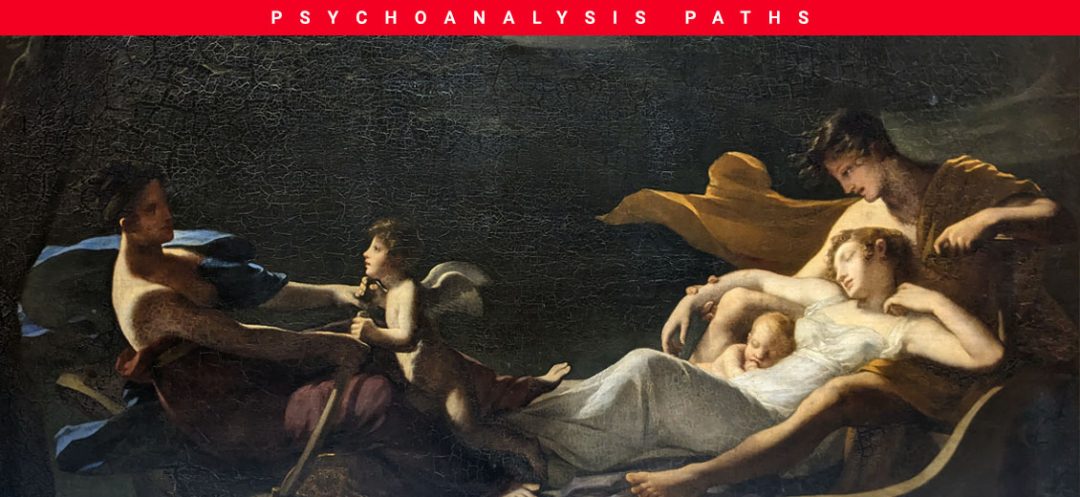Listen to the article
Every week, we invite you to explore a striking quote from a great psychoanalyst to reveal its depth and richness. These lapidary, often provocative, formulas open up new perspectives on the intricacies of the human psyche. By deciphering these quotes with rigor and pedagogy, we invite you on a fascinating journey to the heart of psychoanalytic thought to better understand our desires, anxieties and relationships with others. Ready to dive into the deep waters of the unconscious?
“Happiness is a child’s dream realized in adulthood.”
This quote is taken from the book Civilization and Its Discontents, published in 1930, in which Sigmund Freud explores the question of happiness and the obstacles that oppose it. It is a complex notion as it includes two associated but opposing poles: the pursuit of satisfaction and the avoidance of suffering. Internal, mainly unconscious factors intertwine with external societal factors.
A brief reminder to help us understand it. From birth, the human psyche is driven by the pleasure principle, the pursuit of immediate satisfaction of needs and desires, and the avoidance of any form of displeasure. For example, the infant, in its relationship with its mother, bathes in absolute completeness, in total bliss. At this stage, it does not differentiate between itself and the outside world. In this fusion state, the only acceptable one, it perceives itself as omnipotent, capable of magically satisfying its desires.
With psychic maturation, the child will gradually, if helped, have to renounce the immediate satisfaction of pleasure and confront the reality principle. It will then discover that it is a dependent, separate being, subject to limits and frustrations. This indispensable passage is, however, experienced as a real tearing away, a deep narcissistic wound. Yet, the imprint of original happiness never completely fades: it persists in the unconscious as an ideal, a dream of reunions uniting delight and infantile omnipotence. This is the case, for example, of men and women in power in Lebanon who are pathologically stuck, in their vast majority, at this stage.
In adulthood, the pursuit of happiness can be confused with the unconscious desire to rediscover this experience of absolute and immediate satisfaction, to relive this state of fusion completeness, this enjoyment without constraints or limits, as, for example, during a passionate love relationship. However, it is a quest doomed to failure, as reality, both internal and external, constantly opposes it. We have now become other beings, lacking, confronted with otherness, with anxiety, and with the inevitable frustrations of the reality principle that are the lot of all human existence.
Culture itself, despite the alternatives it offers us, paradoxically contributes to widening this gap between our ideal of happiness and what we can actually achieve. To make life in society possible and sustainable, we must indeed repress a large part of our aggressiveness and impulses. With their channeling, our unattainable desires are transformed into socially acceptable achievements. The infantile nostalgia for lost happiness can thus be sublimated into a cultural work leading to a sense of satisfaction.
Nevertheless, this renunciation is very costly psychically: it generates deep malaise and an unconscious sense of guilt. It even happens that some, to escape this reality, seek refuge in neurosis, addiction, or even psychosis. The more civilization progresses, the more demanding it becomes, and the more the dreamed happiness recedes, reducing itself to brief experiences of fleeting pleasures.
Yet, it is not about giving up on the idea of happiness entirely. If we must let go of the dream of unlimited omnipotence or the illusion of permanent happiness, we still have the opportunity, as mentioned, to find substitute satisfactions in activities such as artistic creation, intellectual pursuit, work, or lucid intimate interpersonal relationships. We thus obtain perhaps more modest but more lasting enjoyments.
To achieve this, we must first consent to a form of mourning: the mourning of the original narcissistic completeness, of this infantile enjoyment that is forever forbidden to us. Renouncing this haunting ideal is the condition for reaching a human-sized happiness, that of a desiring but limited being, in search of always precarious and imperfect satisfactions. We could then conceive happiness as an ephemeral state that we should not deprive ourselves of.
There is also another necessary requirement to authentically enjoy these fleeting moments: achieving reconciliation with oneself, a state of inner peace. This will require, for those who wish to achieve this goal, through analytical therapy and after thorough elaboration, to bring to light the repressed and still tyrannical conflicting aspects, the nagging unfulfilled desires, past traumas, in short, a whole subjective history made of sufferings, anxieties, and torments.
Only then can we hope to reconcile, as much as possible, with our tragic human condition and escape the neurotic unhappiness linked to maintained illusions. It may be a disenchanted lucidity, but it is salutary for achieving relative tranquility.
To help us in this, perhaps we can draw inspiration from the difficult but very precious exhortation of Michel de Montaigne who, long before F. Nietzsche, invited us to (re) become what we are and to desire nothing else.




